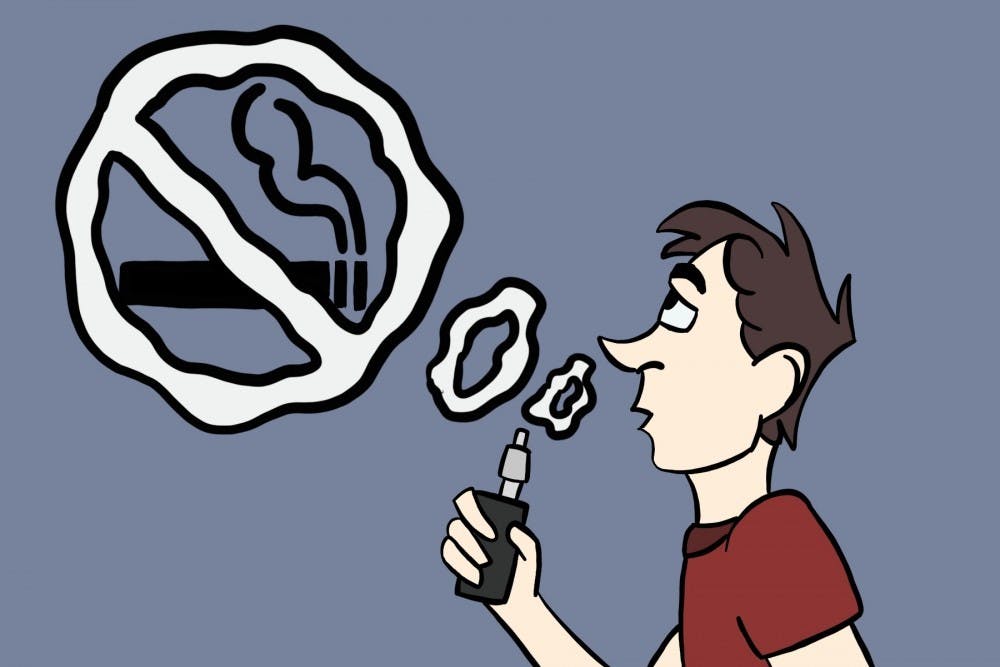On Feb. 2, Tempe City Council released a new plan to enact tobacco sales licenses to address youth vaping and tobacco use. This replaced its old plan: banning flavored tobacco products, such as e-cigarettes and menthol cigarettes. Though I agree with the spirit of this policy, the approach is flawed because it fails to target the most important demographic: the youth.
Arizona is one of 10 states without a statewide tobacco licensing registry. A licensing registry is meant to hold sellers to account with the threat of losing their licenses to sell if they break tobacco laws. However, cities, such as Tucson and Flagstaff, have implemented tobacco sales license registries on a local level through ordinances, similar to what Tempe City Council is proposing.
"We've heard from school boards, parents and health advocates saying that something needs to be done about vaping and tobacco use by our kids," Councilmember Doreen Garlid said in a committee meeting regarding the plan. "As councilmembers, it's our responsibility to look out for the health and safety of our youth. We will continue to work to make sure that these dangerous and addictive products stay out of the hands of kids and teens."
I absolutely agree with the sentiment of combating youth vaping. What I disagree with, however, is how the City Council is getting its ideas.
Garlid said it herself: the council has listened to school boards, parents and health advocates. But in my eyes, the elephant in the room is the group the council hasn't listened to; the group that it is trying to target with this proposal.
"I don't think that unless you see the problem firsthand you can actually truly understand it," said Joe Beining, a freshman studying political science and psychology at the Tempe campus. "(If you) try to act like you're the voices of the people who see this stuff, it's not gonna do anything."
If you're going to effectively create policy to address a problem, you should focus on taking ideas from the group most affected by that problem. In this case, that would be the youth.
"I don't think we were ever really taught a whole ton about vaping," Beining said. "There was a lot of stuff about alcoholism and drugs but for whatever reason, vaping seemed to get kind of swept under the rug."
I, too, think that the best solutions to the vaping crisis stem from education. In my own experience, I was not taught much in regard to vaping or the long-term health effects experienced by its users.
Sure, implementing a tobacco licensing registry isn't a bad idea, but to put it in Beining's words, "you know a guy who knows a guy who's gonna sell to you."
A tobacco licensing registry can't prevent an of-age person from buying vape and tobacco products for someone underage, but education on the subject can prevent an underage person from having someone buy for them in the first place.
READ MORE: Tempe City Council pivots to restrictions instead of bans on vape and tobacco
Dylan Seeman, a sophomore studying art at the Downtown Phoenix campus, started smoking when he was 13 years old. Currently, he is trying to quit. He thinks that education would have put him off of his habit before he started.
"The biggest problem is not realizing that these (cigarettes and vapes) have consequences," he said. "I think if you took me when I was a little kid and you showed me someone in a hospital and they were gasping for air and you're like 'oh, that can be me,' that’s a much bigger educational impact than telling me something's bad."
Simply telling kids that something is bad for them down the road won't make them understand the true harms and risks of it. You have to show them those consequences for them to truly register.
"This has been my biggest regret in life and all because I saw 50s movies and I thought it was cool," Seeman said. "I thought 'man I really wanna be like that guy, that guy is cool!' No, you don't. It actually just chains you and now I lose $300 a month."
So perhaps, instead of just attacking the issue of youth vaping at the point of sale, I'd say the City Council should also be focusing on the educational aspect of the issue. If you want true change and a real reduction in youth vaping, you need to focus on telling kids why they shouldn't vape, instead of just restricting their means to vape in the first place.
Tempe City Council has its heart in the right place, but the proposed plan doesn't fully recognize the reality of the situation. Should the council want its approach to match reality, it needs to talk to the youth it aims to help.
Edited by Kate Duffy, Reagan Priest, Greta Forslund and Anusha Natarajan.
Reach the columnist at swmcgee@asu.edu and follow @swmcgeemedia on Twitter.
Editor's note: The opinions presented in this column are the author's and do not imply any endorsement from The State Press or its editors.
Want to join the conversation? Send an email to opiniondesk.statepress@gmail.com. Keep letters under 500 words and be sure to include your university affiliation. Anonymity will not be granted.
Like The State Press on Facebook and follow @statepress on Twitter.




